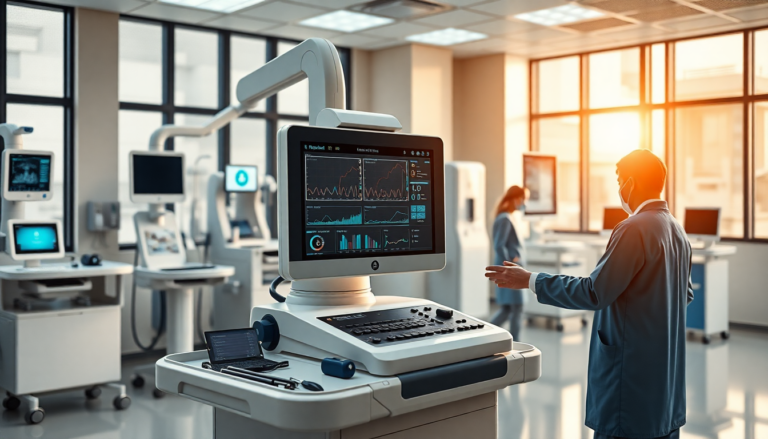Argomenti trattati
The integration of artificial intelligence (AI) into medical devices is not just a passing trend; it’s a significant leap forward in the healthcare landscape. As technology continues to evolve, the Food and Drug Administration (FDA) is dedicated to promoting innovation while ensuring that safety and efficacy remain paramount. So, what does this mean for healthcare providers and patients? In this article, we’ll explore the current market dynamics of AI-enabled medical devices, their regulatory framework, and the exciting opportunities they present.
Market Overview of AI-Enabled Medical Devices
In recent years, the world of medical devices has undergone a remarkable transformation thanks to AI technologies. The FDA actively encourages the development of innovative devices that not only enhance patient care but also streamline various healthcare processes. Have you ever wondered which AI-enabled devices are currently on the market? The AI-Enabled Medical Device List serves as an invaluable resource, providing insights into the devices authorized for marketing in the United States. This list underscores the growing trend of integrating AI into healthcare tools and highlights the FDA’s commitment to maintaining public safety while fostering innovation.
According to the latest data from the FDA, there’s been a steady increase in the number of authorized AI-enabled devices. This trend signifies a strong interest from manufacturers eager to leverage advanced technologies. It’s important to note that this list is dynamic; it’s updated regularly to include newly authorized devices and relevant decision summaries, ensuring that healthcare professionals have access to the most current information. Isn’t it fascinating how quickly the landscape is changing?
Analyzing Key Areas of Interest
As we dig deeper into the implications of AI in medical devices, identifying the areas experiencing the most growth becomes essential. Devices that enhance diagnostic capabilities, improve patient monitoring, and facilitate personalized treatment plans are leading this technological revolution. For example, AI algorithms are being integrated into imaging devices, significantly enhancing accuracy in diagnoses, which ultimately leads to better patient outcomes. How could this shift impact the way we approach health management?
Moreover, the role of AI in data analysis is crucial. Devices equipped with AI can process vast amounts of data, offering healthcare professionals actionable insights that were previously out of reach. This capability not only improves clinical decision-making but also boosts the overall efficiency of healthcare delivery. Isn’t it remarkable how technology can reshape the way we understand and treat health issues?
Pricing Trends and Investment Opportunities
The financial landscape surrounding AI-enabled medical devices is ripe with investment opportunities. With increasing demand and technological advancements, there’s potential for significant returns on investment (ROI) in this sector. The trend toward healthcare digitalization shows no signs of slowing, paving the way for further innovations and market expansion. What does this mean for savvy investors looking to make their mark?
Investors should keep an eye on emerging companies that are pioneering AI applications in the medical field. By analyzing market trends and consumer needs, investors can pinpoint promising opportunities that align with the growing emphasis on technology-driven healthcare solutions. Additionally, understanding the cap rate and cash flow associated with these investments will be crucial for maximizing returns. Are you ready to explore the potential of this burgeoning market?
Practical Guidance for Stakeholders
For healthcare providers and investors alike, staying informed about the evolving regulatory landscape and market dynamics surrounding AI-enabled medical devices is crucial. Engaging with the FDA’s resources, particularly the AI-Enabled Medical Device List, can provide valuable insights into which devices are currently authorized. Have you checked it out yet?
Furthermore, stakeholders should consider establishing partnerships with technology companies specializing in AI to stay ahead of trends and innovations. This collaboration can facilitate access to cutting-edge devices and enhance the quality of care provided to patients. How can strategic partnerships empower your practice or investment strategy?
Future Outlook
Looking ahead, the integration of AI in medical devices is set to accelerate, driven by ongoing technological advancements and a rising demand for efficient healthcare solutions. The FDA’s proactive approach to regulating these devices while promoting innovation will likely pave the way for a more diverse range of AI-enabled products entering the market. What exciting developments might we see in the near future?
In summary, the future of AI in the medical device industry holds immense promise. By understanding the current landscape, identifying key areas of interest, and keeping abreast of regulatory developments, stakeholders can navigate this dynamic environment effectively. Are you ready to embrace the future of healthcare technology?

